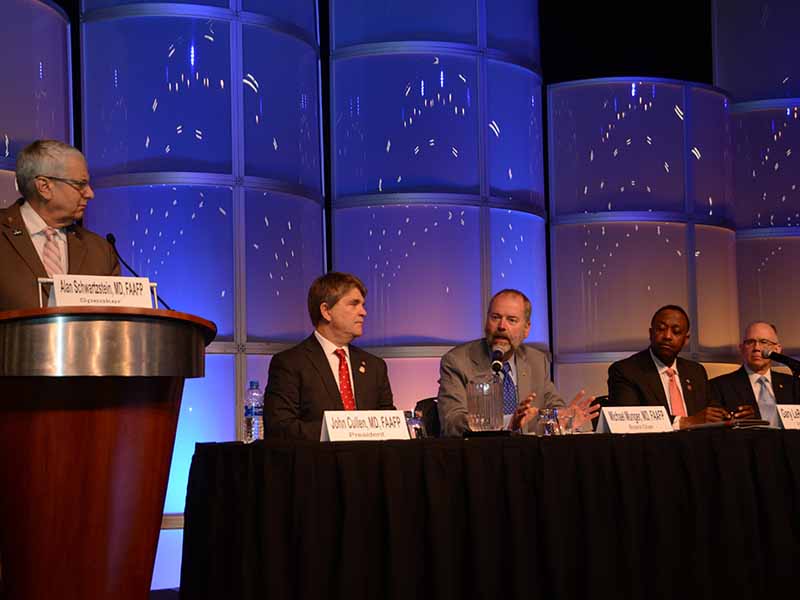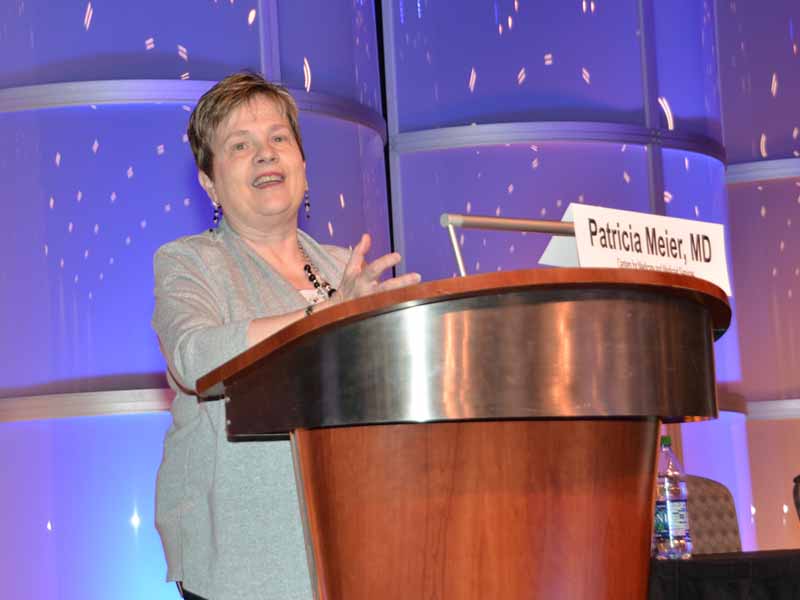Family Physicians Voice Questions at Town Hall Meeting
April 30, 2019 01:01 pm Sheri Porter Kansas City, Mo. – An early morning Town Hall meeting held here on April 26 as part of the 2019 AAFP Leadership Conference featured breakfast followed by an opportunity for family physicians to pose questions to Academy leaders.
With Speaker Alan Schwartzstein, M.D., of Oregon, Wis., moderating the leadership panel, audience members directed their questions to AAFP President John Cullen, M.D., of Valdez, Alaska; Board Chair Michael Munger, M.D., of Overland Park, Kan.; President-elect Gary LeRoy, M.D., of Dayton, Ohio; and EVP and CEO Douglas Henley, M.D.
Henley opened the meeting with a reminder about HHS' recently announced CMS Primary Cares Initiative. He proudly pointed out that the new payment model designs were strongly influenced by the AAFP's Advanced Primary Care Alternative Payment Model.(38 page PDF)

AAFP Board Chair Michael Munger, M.D., center, takes a question from the audience during the April 26 Town Hall meeting at the AAFP Leadership Conference. The other members of the AAFP leader panel are (left to right), Speaker Alan Schwartzstein, M.D.; President John Cullen, M.D.; President-elect Gary LeRoy, M.D.; and EVP and CEO Douglas Henley, M.D.
After a brief discussion about that initiative, Schwartzstein then invited questions about anything audience members wanted to explore with the panel.
AAFP Health Care Reform Primer
One of the first family physicians to step to a microphone asked for more information about the AAFP's work on health care reform, and Henley took the opportunity to announce the availability -- "as of this morning," no less -- of an AAFP health care reform primer "Health Care for All: Moving to a Primary Care-Based Health System in the United States."
"From that landing page you can go to the new health care reform primer that the Board developed after the (2018) New Orleans Congress of Delegates meeting, where a COD resolution was adopted that called for us to inform and educate all of our members about the new Academy policy on health system reform," said Henley.
"I encourage you to look at that primer and educate yourself on the Academy policy -- what it says and what it doesn't say," because it will be the AAFP's guide moving forward, he added.
The primer, in digital format only, is available solely to AAFP members and state chapters.
Story Highlights
Rural Vs. Urban Practice
Another family physician in the audience spoke about the similarities of treating rural and underserved populations. "I live in a small town, and what I've found in talking to my urban colleagues is that they have very similar practices to mine. What happens in rural America also translates to urban practice," he said.
LeRoy noted that his Dayton clinic serves an urban population, and he agreed that health care reform is about identifying and fixing obstacles that affect patients regardless of practice setting or location.
Board Certification Vision for the Future
Next up was a question about whether the AAFP had provided comments about the American Board of Medical Specialties' Vision for the Future Initiative regarding the board certification system.
Munger responded that the AAFP was very interested in the initiative and that he had testified in Washington, D.C., on behalf of the Academy.
"We (also) have been engaged with the ABFM (American Board of Family Medicine) over the past several years, and we have been strongly messaging what our members have been telling us and messaging about the changes that the commission has recommended," said Munger. "This is a work in progress. We view what has been done as positive but will continue to work with them and hopefully get to meaningful board certification for all of us."
EHR Update
Another family physician asked panel members for an update on the AAFP's work in the area of health IT.

CMS Chief Medical Officer Patricia Meier, M.D., takes the podium after the AAFP Town Hall meeting to provide updates and take audience questions on various CMS projects, including the Patients Over Paperwork initiative and the Quality Payment Program.
"The Board has approved a special project over the next three and half years to engage with the early developers of artificial intelligence and machine learning," said Henley. "One of the goals is to reduce administrative burden at the practice level both in terms of eliminating the number of clicks that you need to make and ultimately eliminate the need for a keyboard at all."
He described a future that could make use of natural language processes so that family physicians could engage with patients in a normal encounter "and the computer would document the exam, so you don't have to," said Henley. "The Board heard an update on that project just this week, and it's moving forward very rapidly" under the guidance of AAFP VP and Chief Medical Informatics Officer Steven Waldren, M.D., he added.
Family Physician Shortage
A physician stepped to a microphone and asked the panel to discuss the use, in some states, of midlevel providers to address the family physician shortage. Specifically, "has the Academy thought about how those folks are trained and introduced in the medical world?"
LeRoy got the loudest applause of the Town Hall session with his response.
"Medicine is a team sport, and the physician is the leader of that team. That's critically important, and that's why I hate the term 'provider,'" said LeRoy. "There's a reason that we put in all the hours of training in medical school and residency."
Cullen added this comment: "Family medicine and primary care is really hard. And it's interesting, because in Alaska, we've had independent nurse practitioners for about 25 years," which, he said, has demonstrated two things.
"They're really not going into primary care -- they're going into specialty care. And the second thing is they're not going rural -- they're all going urban."
Opioid Use Disorder
The final question of the meeting came from a family physician asking the AAFP for help and support in dealing with patients who have opioid use disorder.
She said that coming up in medicine, "we were taught how to prescribe opioids, but now I look for resources on how to get people off the opioids I have prescribed."
"These are my people, and I feel responsible for this," she added.
LeRoy directed audience members to an AAFP position paper on chronic pain management and opioid misuse. "We have been at the forefront of this issue," said LeRoy, and family physicians need to do their part by reading and disseminating the information that's out there.
Munger assured family physicians that they have the AAFP's full support on issues related to opioids.
"We've also stepped up every time there is a chance to work with other organizations -- and every time there is a chance at the national level to work with CMS and to have a representative sit on any type of task force or work group on opioid misuse," said Munger.
Related AAFP News Coverage
2019 NCCL Delegates Elect New Leaders
(4/27/2019)
2019 NCCL
Family Physicians Learn to Say 'Yes, And …'
(4/26/2019)